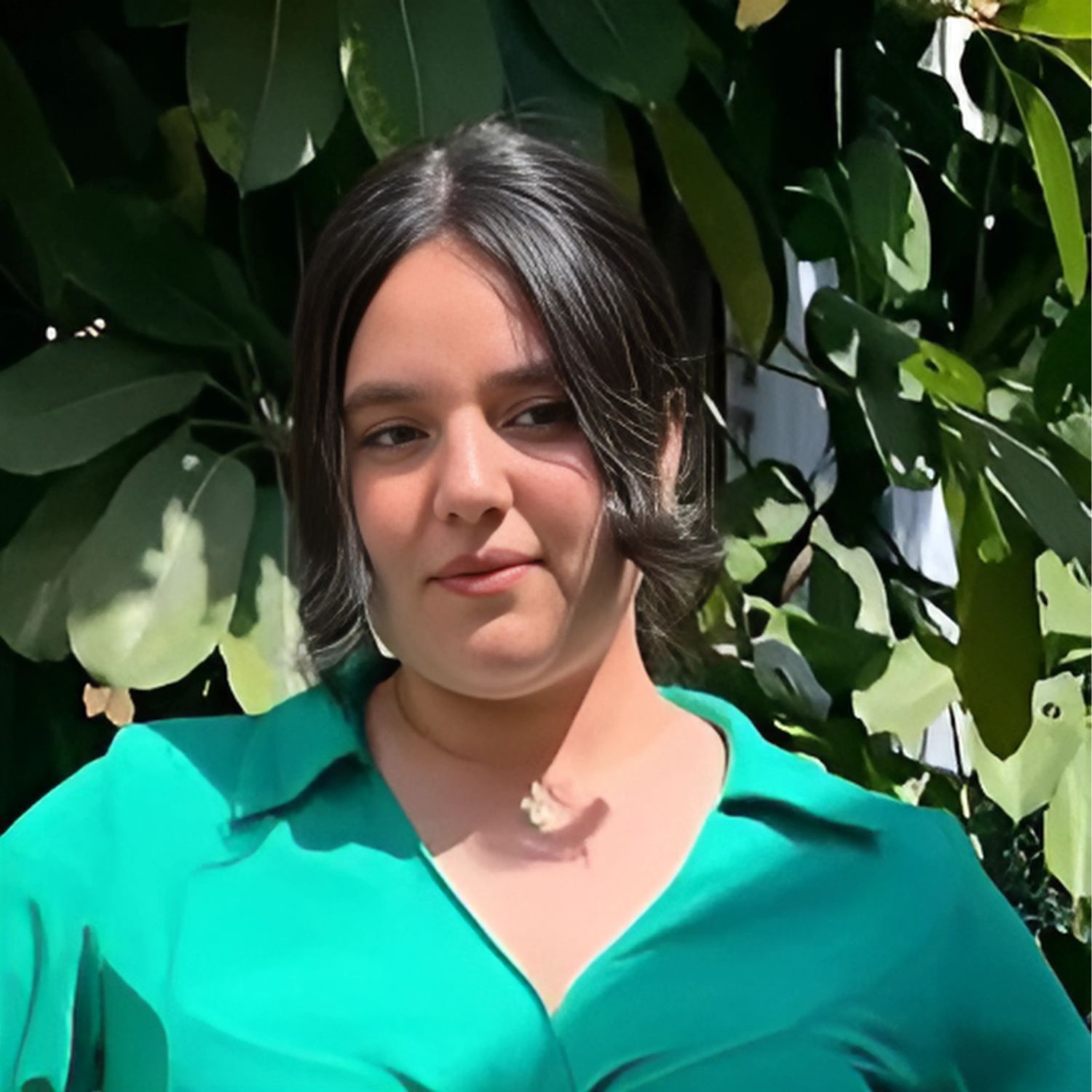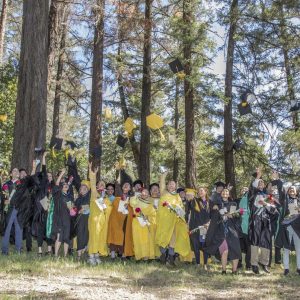
Graduation speeches are transcribed below.
Norbel Casas (BA ‘22)
Hello, everyone. My name is Norbel Casas.
I would like to share my thoughts and feelings on this special day.
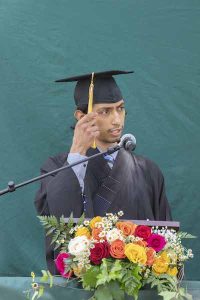
Every day I practice gratitude in my evening qigong sessions. I start with something small like tea, then I move on, eventually saying I’m grateful for DRBU, Sudhana Center, students, faculty, and staff, parents, and family. Everyone is here in one spot. I may have been a handful as a child. Or as they say, it takes a village to raise a child. I thank this village that is in front of me for nurturing not only me, yet all the students here too.
I would like to share a passage from The Documents, which is part of the Confuncist Canon. This section is called ‘The Declaration of Tang.’
(side note to self: ***gets into character***)
When King Tang came home after the conquest of the Xia, he came to Bo and there – before all the people – he made this declaration.
‘My people,’ said the king, ‘All of you, from every region of the land, listen carefully to what I (a straightforward man) am about to say. The Emperor above all Empereos has endowed every person with a moral sense, and this is their essential, original nature. However, to ensure that they stay true to this essential nature, it is necessary to have rulers. …(whisper to the audience: Nowadays we call them leaders, so people won’t feel oppressed.)
…
‘This is why I, unimportant as I am, like a child have been granted the Mandate of Heaven Which lights up the whole world with its authority. I cannot ignore it or stop doing what is asked of me.
The Mandate of Heaven cannot fail!! (***hits the podium with fist***)
If anyone anywhere does something wrong
Then the responsibility will lie with me
I say this again as a straight-talking man!
And if I do something wrong, you may also be assured
That no blame will fall on you.
I won’t unpack that like I usually would in a paper. And [I’ll] let you reflect on how such role models would affect our modern world.
Warren Chew (BA ‘22)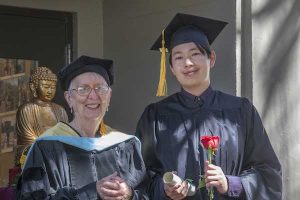
When I think back to my first year here at DRBU, what I remember feeling the most is fear. I was afraid of being alone in an unfamiliar environment, living away from my home and family for the first time. But something occurred that helped me to feel more comfortable. On the days that I felt depressed and alone, some of the older students here would occasionally approach me to try to understand what was on my mind. And at first, this made me uncomfortable because I didn’t understand why people would go out of their way to offer support. But eventually I’ve realized that some people just want to help others—unconditionally and without anything in return. And this was absolutely shocking to me, because I wasn’t accustomed to this kind of culture before. But over time I’ve come to accept this aspect of the community.
Whenever I sought help, whenever I tried to make myself heard, there has always been at least one person around here who was willing to listen to me. And that’s not always something that I’ve had access to before in my life. For a long time, it was difficult for me to speak my mind and articulate what I truly wanted to say to others. I didn’t think that what I had to say would be of much value to other people. But over time I’ve learned that my voice does have value. And so do the voices and perspectives of others. In class, I was able to learn from others and realize that people deserve much more than how I depict them to be inside of my head. I’ve learned that people can be insightful, vulnerable, and honest as long as I’m receptive to those parts of myself as well.
I’m grateful for this experience. I’m grateful for having the opportunity to grow up and mature in a safe environment, where everyone is looking to better themselves as well. And although I’m not often proud of myself, after taking some time to reflect, I can say that I actually am proud of myself for completing this program. I’m still fearful of the future and the unfamiliar situations that I’ll confront. But I’ve learned to succeed in spite of that fear. I’ve learned that it’s ok to make mistakes, to embarrass myself, and to stumble along the way. Although I still get uncomfortable, anxious, and depressed at times, I’m not going to attack myself for having those feelings—because I’ve realized their validity in my process. Discomfort plays an important role in my growth, so rather than ignore it, I choose to accept it in the same way that I’m beginning to accept other people into my life as well.
I’m not sure what the future has in store for me after graduation, but I know I have the potential to confront it and make it my own with the foundation that I’ve built here. Thank you.
Lisa Liang (MA ‘22)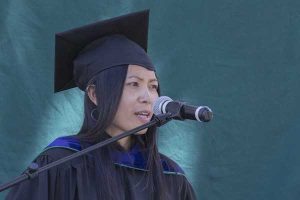
Today is a celebration of our experiences we had here. I’ve been very fortunate to spend the last few years in this robust community. And I’m going to miss everything about this place, the rich class discussions, nature, birds, deer, wild flowers, long walks on the trails in the back, even the gray squirrels who come down running in front of your car, taking a chance every time. Similarly, we all took a chance to come to DRBU, and we made it out alive. Having gone through the BA and MA program, it feels that studying here is all about introspection and reflection, but it’s way more than that! It’s about building and maintaining connections. It’s cherishing the little moments of sharing snacks together during class breaks. It’s enjoying the company of fellow spiritual friends. And it’s making memories that you will carry with you for the rest of your life.
Now I’m going to share a little bit of IYKYK (“if you know, you know” moments of DRBU) that only insiders would understand:
- When the peacocks take their sweet time to cross the road
- When you need a break from DRBU, you go to Black Oak, but then you see everyone from DRBU
- Running into Doug and getting deep into the readings before class even starts
- Passing by Unicorn Way, Protector Avenue, Bodhi Way, Compassion Way, Horse Whinny Way, Filial Avenue, etc.
- Getting to the class is only a five-minute walk, yet people are still five-minutes late
- Thinking that you got it, that you understand what the text is saying, then comes to class and professor reminds you to let go of everything that you know, even the idea of getting it
- When you want to go camping and you realize your entire campus is practically a forest
- When you’re in class having shared inquiry and you forget that you are in class because you’re enjoying the discussion so much
- When you’re craving something sweet, and donuts randomly turn up in class or show up at the lunch table
- When you spend the entire class discussing about one phrase of a book but only get to one line in the text
- When you use countless hours to clear up the field and plant vegetables, but nothing sprouts. Or when something sprouts, the squirrels or animals eat it before you can harvest it
- When you’ve had every form of tofu there is LOL
- When you’re a student, lunch pick-up driver, dishwasher, and farmer all in one day
- When you spend three hours decoding one Sanskrit word or phrase and trying to figure out the best translation choice
- When you sit in class struggling in silence and hoping your professor doesn’t call on you to share
- When you and your friends get excited to see sheep nearby grazing and then go on spontaneous adventures to get a closer view of the sheep
- When you cry privately, see your cohort giving speeches, saying sentiment goodbyes, and hearing sighs of relief, you know it’s that time of the year
Rachel Croft (MA ‘22) 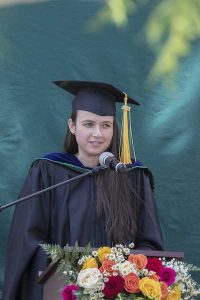
I want to say today that words can’t actually express how much my time here at DRBU has meant to me and how grateful I am for the opportunity to have attended this university. So many of the best things in life are like that, existing in a space that words can’t quite touch. The Chinese Buddhist master Huineng says it like this, “Believe only that the Buddha is without words and the lotus blossom will bloom from your mouth.”
But one thing this master’s program has taught me is the importance of trying to capture the ineffable with words. If we human beings didn’t make a habit of doing just that, then places like this wouldn’t exist and people like me would be a lot more confused. My time here at DRBU has helped me become clear about some of the most important questions in life like: What is true about this reality we all share?; What are the bits and pieces that make up this being I call “me”?; What are the deepest yearnings of my soul?; and What is the path to realizing those?
I’m so grateful to everyone who was part of my experience here or supported me from afar. I couldn’t be here, for example, without the support of the donors and my family. And my interactions with friends, faculty, and staff in this community have been unforgettable and invaluable. I wish all my fellow graduates and everyone here ever-increasing peace, joy, and wisdom, and I hope our affinities bring us back together sometime soon.
Bhikshuni Jin Xiang (Translation Certificate Program, ‘22) 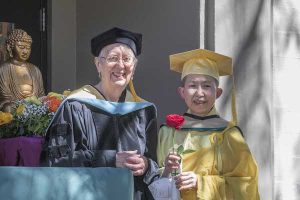
All Sangha members, professors, instructors, fellow students, and honored guests. I am representing my class of 2022 from the Graduate Certificate in Buddhist Translation. We are the third cohort that has graduated from this one-year translation certificate program.
I would like to thank the first two cohorts for paving the way for us; without them, we wouldn’t have received such an abundance of rich materials. Thanks to our hard-working program director, DM Yi, and instructors, we had an opportunity to discover different theories of translation from a diversity of traditions and cultures, such as Bible translators, and Spanish and Tibetan translators. We had the privilege of hearing from diverse guest speakers, including many of our own DRBU professors. Hearing Ernie read Middle English was pretty eye-opening. . . . I am grateful to professors Barbara Waugh and Lauren Bausch for helping me learn Sanskrit in the past years. With that knowledge, I was able to contribute to the translation work.
When I first applied for this program, I didn’t know what a treat it would be. Now, I can see for myself the challenges in translating ancient texts into modern English. At the same time I feel the joy of being involved in the translation process, especially in translating Earth Store Sutra and some chapters of Avatamsaka Sutra. As you know, getting all the chapters of that sutra published into English is long-anticipated by many English speakers. Know that we made a lot of progress, considering we were doing six hours of translation per week in the past two semesters.
Even though trying to capture the true meaning and spirit of an original text seems impossible, as translators, we feel indebted to the pioneers—eminent monk-translators—who journeyed to India and the surrounding regions to bring Buddhist scriptures to China. Of course, I am grateful that Venerable Master Hua, the founder of DRBA and DRBU, made it possible for us in America to encounter the Buddhist sutras.
It is said that we will never be able to translate 100% of the meaning and intention of the original author, i.e., the tone and spirit of the original text. To echo one of my classmates, when we translate we are translating ourselves. We may have individual views and opinions, but in a team atmosphere, we are trying to tap into the collective awareness. In our meditation lab sections, we also try to go toward that same goal through getting to know our selves and our habitual thought patterns. I believe that to know ourselves is to get closer to that collective awareness. When we know ourselves better, we can become better translators and better team players.
After completing this translation certificate program, 我足矣 (wǒ zúyǐ) I feel satisfied. I feel more confident about translation. And I believe that the program is on the right track in training students to become better translators as well as better persons and cultivators. I remember one instructor said in a class, “We get enlightened as we translate.” Who wants to get enlightened, come this way.


